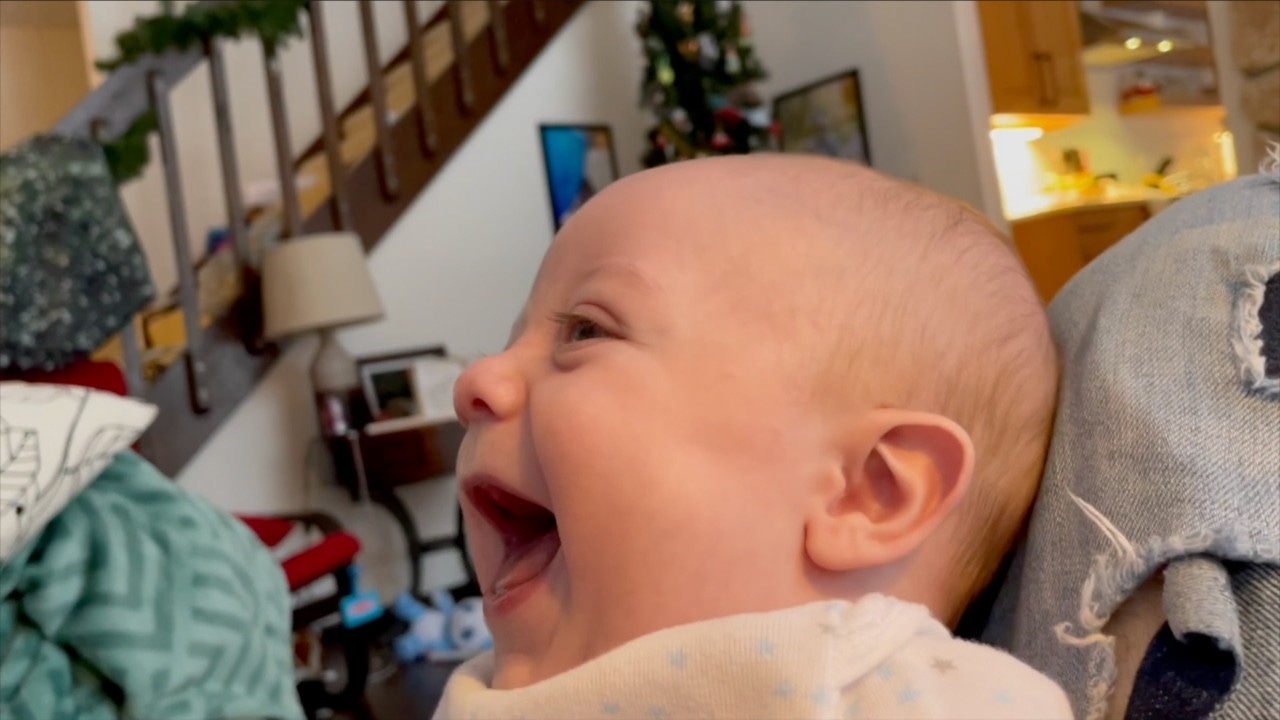Experimental treatment helps infant with rare heart defect beat the odds
[anvplayer video=”5091294″ station=”998122″]
A baby boy from Vadnais Heights diagnosed with a rare and often deadly heart defect is beating the odds thanks to care he received at Children’s Minnesota.
August’s parents are sharing his story in honor of American Heart Month.
“Somehow a miracle happened for us,” said mother Bitsy Watson.
Watson learned while she was pregnant that August had a congenital heart defect known as Ebstein anomaly, which involves a malformed valve that causes blood to leak.
The couple received the diagnosis during their 20-week ultrasound.
“Ebstein anomaly is known to be one of the most severe forms of congenital heart disease. Babies with this heart condition may either die in the womb or shortly after birth and those odds are almost a 50/50,” said Dr. Lisa Howley at Children’s Minnesota.

August Watson — a baby who was diagnosed in the womb with Epstein anomaly, a rare heart defect — laughs while being held by his mother.
Howley directs the fetal cardiology program at the Children’s Heart Clinic and monitored Watson’s pregnancy very closely following the diagnosis.
“Eventually the whole right side of his heart did not have any blood flow going out of it and resulted in him getting progressively more sick. He was going into heart failure and we started to see fluid developing around his heart. Those are signs he’s on the decline and potentially wouldn’t survive the pregnancy,” Howley said.
Watson said, “That was a really tough blow. It was shocking and kind of horrifying, just kind of sitting there thinking, ‘OK, what’s going to happen here? Are we going to lose our baby?'”
Howley suggested an experimental therapy that has been used in rare cases, with only anecdotal reports of success.
The Watsons’ response: “We will try anything to see if it can save him.”
The treatment itself was relatively simple. It involved taking a pill called indomethacin, an anti-inflammatory drug in the same class as ibuprofen, twice per day during pregnancy.
The day after Bitsy Watson started the medication, she had another ultrasound to see if it was making a difference with the baby’s heart.
“We both were just frozen, waiting, clenched fists,” Watson recalled. “Dr. Howley walked in the room and the look on her face was just: ‘Is this for real?’ She said, ‘His heart did not look like this yesterday. It’s looking way better.’ I will never forget that for the rest of my life. It felt like living a miracle.”
Howley added, “Usually we look all prim and proper in our white coats but in this case I’m pretty sure I did at least one fist pump.”
She said she has used the medication for this purpose only one or two times before.
“August has had the best reaction to it I’ve seen. It was the medicine we needed to stop his heart from going into progressive heart failure. It stabilized him and reduced the leakage from his heart. It was incredibly exciting for us,” Howley said.
August survived the pregnancy and had open heart surgery at two days old.
“He’s doing really well,” said his father, Tony Watson. “It’s just amazing that somehow that medication has gotten to this point where it can affect one little valve in a fetus’ heart like this. I mean, it’s just unbelievable.”
Howley credits August’s successful outcome to his early diagnosis and strong partnerships among Minnesota’s health care systems.
“Screening for fetal heart conditions is quite important. Our goal is really to partner with OBs and family practice and perinatal providers around the Midwest to try to improve prenatal diagnosis. Many things are still being missed, so as much as we can optimally screen and diagnose early, that would lead to better outcomes for babies,” Howley said.
Bitsy Watson added, “Now August is just like a regular baby, which I don’t think we pictured that ever happening. It could have been so much different for us. So, to me, it’s all just a resounding highlight of the importance of good health care.”